Fainting is a sudden, brief loss of consciousness. It happens when not enough blood flows to the brain. Many people feel dizzy or lightheaded before they faint. Some also break out in a cold sweat or feel sick to their stomach.
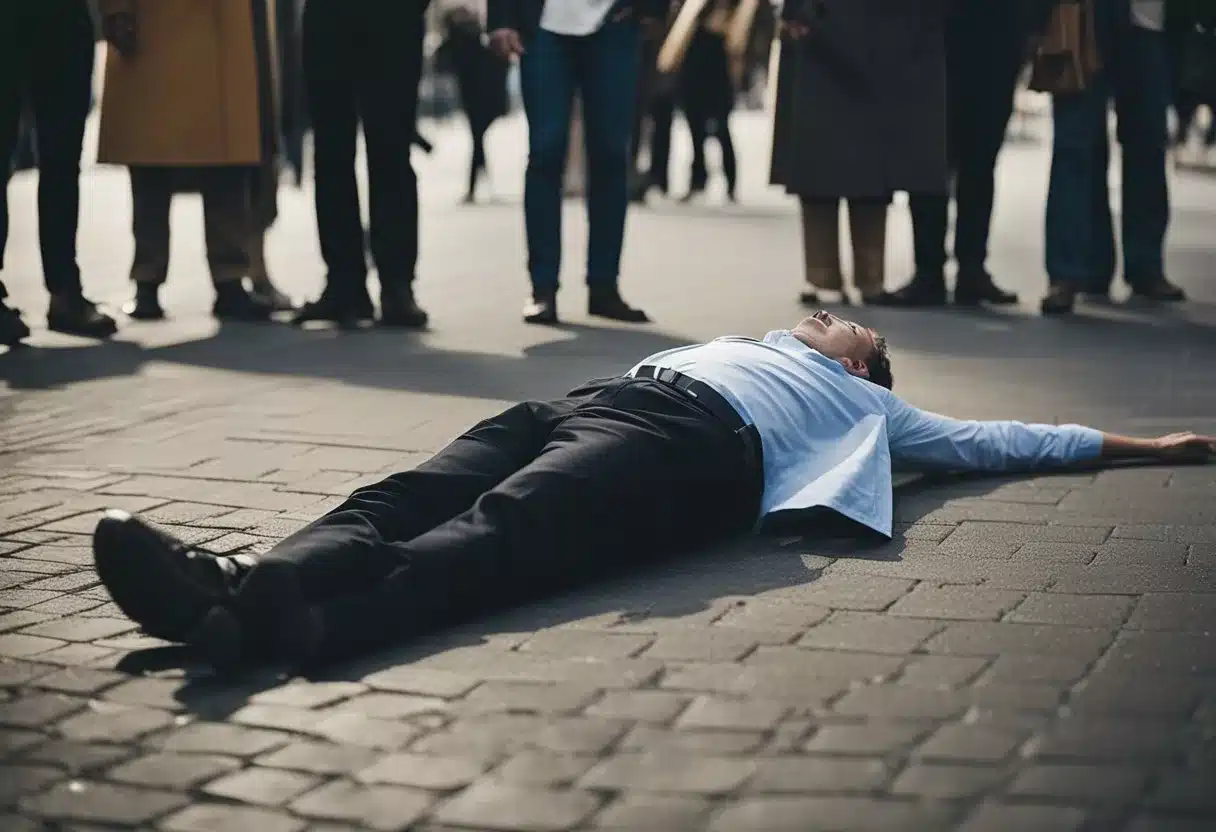
Fainting occurs due to a temporary decrease in blood flow to the brain. This can be caused by many things, like standing up too fast, being dehydrated, or feeling very stressed. Sometimes it’s a sign of a more serious health problem.
When someone faints, they usually wake up quickly. But it can be scary for the person and those around them. Knowing what to do if you or someone else faints can help keep everyone safe. It’s also good to know when fainting might be a sign that you need to see a doctor.
Key Takeaways
- Fainting is a brief loss of consciousness caused by reduced blood flow to the brain
- Common triggers include dehydration, stress, and sudden changes in position
- Seek medical help if fainting happens often or is linked to chest pain or heart problems
Understanding Fainting
Fainting is a sudden, brief loss of consciousness. It happens when the brain doesn’t get enough blood flow or oxygen. People often feel dizzy or lightheaded before fainting.
Definition and Process
Fainting, also called syncope, is a temporary loss of consciousness. It usually lasts only a few seconds or minutes. When someone faints, they often fall down or slump over.
The body has ways to try to prevent fainting. It may make a person feel sick or sweaty. This can be a warning sign. Some people also see spots or feel ringing in their ears before they faint.
After fainting, most people wake up quickly. They might feel confused or tired for a short time.
Common Causes of Fainting
Many things can cause fainting. Some common reasons include:
- Standing up too fast
- Being too hot
- Not eating enough
- Being very scared or stressed
- Some heart problems
- Skipping meals
- Breathing too fast
Certain activities can also lead to fainting. Hard exercise, especially in hot weather, can cause it. Some people faint when they see blood or feel strong pain.
Physical Mechanisms
Fainting happens when the brain doesn’t get enough oxygen. This can occur for several reasons:
- The heart doesn’t pump enough blood
- Blood vessels open up too much
- Not enough blood in the body
When blood pressure drops suddenly, it can cause fainting. The body tries to fix this by making the heart beat faster. It also narrows blood vessels to keep blood flowing to the brain.
Sometimes these fixes don’t work fast enough. That’s when a person faints. The fall helps blood flow back to the brain. This is why people usually wake up quickly after fainting.
Symptoms and Warning Signs
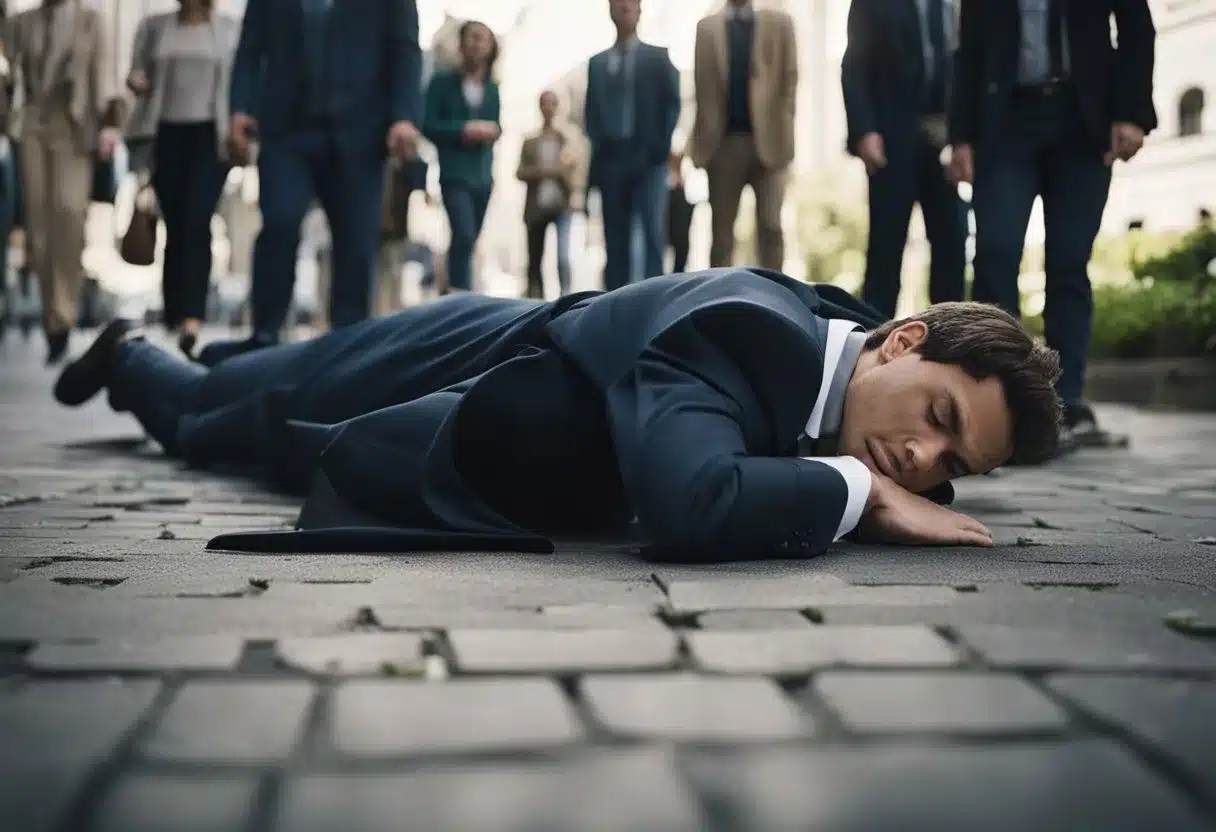
Fainting has distinct signs that occur before, during, and after an episode. Recognizing these symptoms can help prevent falls and injuries.
Before Fainting
People often feel dizzy, nauseated, or lightheaded right before fainting. They may experience cold or clammy skin and start sweating. Vision changes are common, like seeing spots or having tunnel vision.
Some people feel weak or tingly in their arms and legs. Others notice their heart racing or pounding. Numbness in the face or fingers can also occur.
These warning signs usually happen quickly, sometimes just seconds before fainting. If someone notices these symptoms, they should sit or lie down to avoid falling.
During and After Fainting
During fainting, a person loses consciousness and falls if they’re standing. This usually lasts for a short time, often less than a minute.
After fainting, people typically wake up feeling confused. They may look pale and feel weak. Some experience a brief period of blurred vision or dizziness as they come to.
It’s normal to feel tired after fainting. Some people have muscle aches from falling. In rare cases, injuries can occur from the fall, especially in older adults.
Full recovery usually happens within a few minutes to an hour. If symptoms persist or fainting happens often, medical help is needed.
Common Triggers and Risk Factors

Fainting can happen due to various causes. Some people are more likely to faint because of health issues or things in their daily life. Certain actions can also make fainting more likely to occur.
Medical Conditions
Many health problems can lead to fainting. Heart problems like unusual heart rhythms may cause fainting. This happens when the heart can’t pump blood well enough. High blood pressure can also lead to fainting in some cases.
Low blood sugar is another cause. This often affects people with diabetes. Some people faint during or after a blood draw. This is called vasovagal syncope. It happens when the body overreacts to certain triggers.
Dehydration can cause fainting too. When the body doesn’t have enough fluids, blood volume drops. This can lead to a lack of blood flow to the brain.
Environmental and Lifestyle Factors
Heat is a common trigger for fainting. Being in a hot place can make blood vessels widen. This can lower blood pressure and cause fainting.
Stress and strong emotions can also lead to fainting. Some people faint when they see blood or feel sudden pain. Standing for long periods can cause blood to pool in the legs. This may reduce blood flow to the brain and cause fainting.
Not eating enough or skipping meals can lead to low blood sugar. This increases the risk of fainting. Drinking alcohol can also raise the risk.
Orthostatic Hypotension
Orthostatic hypotension is a drop in blood pressure when standing up. It can cause fainting if a person stands up too quickly. This is more common in older adults.
Certain medicines can cause this problem. These include blood pressure drugs and some antidepressants. Dehydration can make orthostatic hypotension worse.
Some nervous system disorders can also lead to this issue. They affect how the body regulates blood pressure when changing positions.
To avoid fainting from orthostatic hypotension, it’s best to rise slowly from sitting or lying down. Drinking enough water can also help prevent this problem.
Prevention and Management
Preventing fainting and knowing when to get medical help are key. Taking simple steps can reduce your risk of fainting spells. Knowing the warning signs helps you decide if you need to see a doctor.
Preventive Measures
To prevent fainting, stay hydrated. Drink plenty of water, especially in hot weather or during exercise.
Keep your blood sugar steady. Eat regular meals and snacks. Avoid skipping meals.
Stand up slowly from sitting or lying down. This gives your body time to adjust to the change in position.
Avoid triggers like hot, stuffy rooms. If you feel dizzy, sit or lie down right away.
Wear loose clothing. Tight clothes can restrict blood flow and make fainting more likely.
When to Seek Medical Advice
See a doctor if you faint often or without warning. This could point to a serious health problem.
Get medical help if you hit your head when fainting. Head injuries can be dangerous.
Seek care if you faint while pregnant, have chest pain, or an irregular heartbeat.
Talk to a doctor if fainting affects your daily life or causes anxiety.
If you have a family history of heart problems, tell your doctor about any fainting episodes.
First Aid and Emergency Response
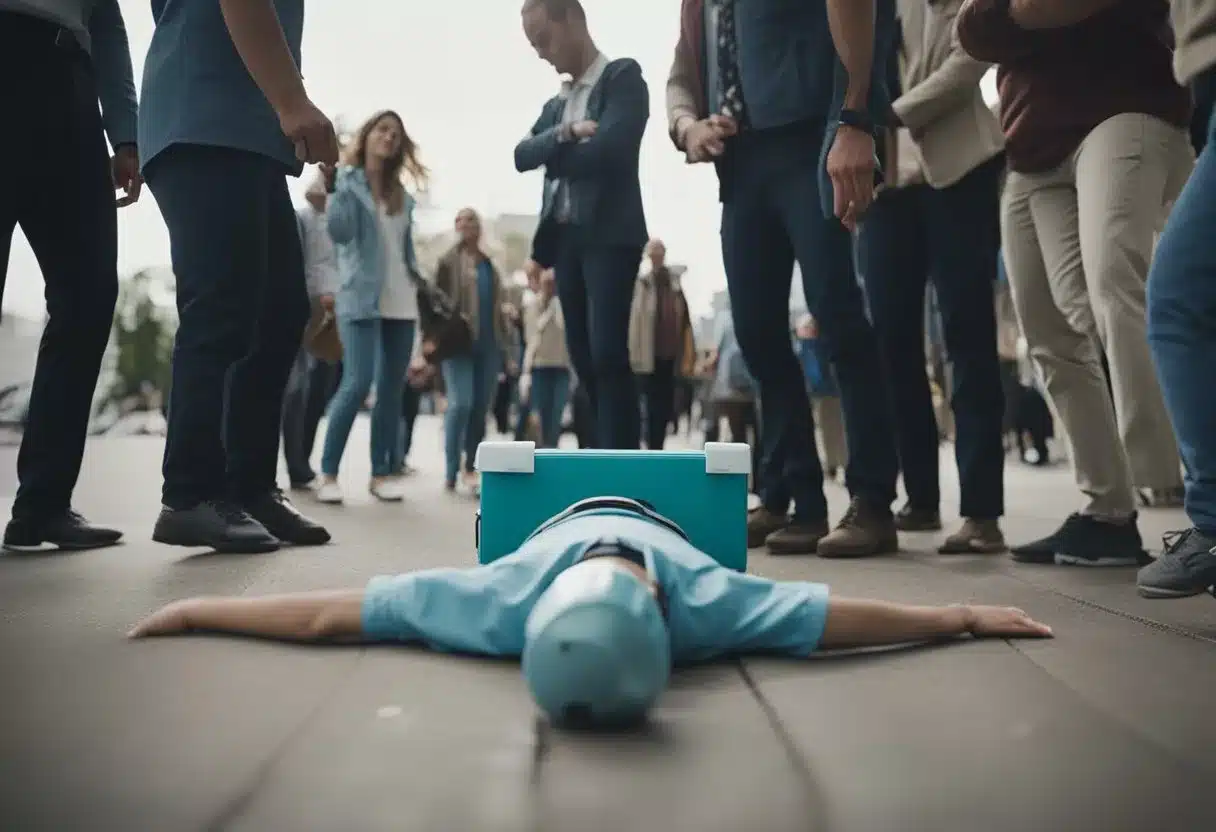
Quick action is key when someone faints. Proper first aid can prevent injuries and help the person recover safely. Knowing when to call for emergency help is also crucial.
Immediate Steps
When someone faints, act fast. Help them lie down on their back. Raise their legs about 12 inches to boost blood flow to the brain. Loosen any tight clothing around their neck, chest, and waist.
Check for breathing and make sure their airway is clear. If they’re not breathing, start CPR right away and call emergency services.
Don’t give the person anything to eat or drink. Keep them lying down for 10-15 minutes, even if they seem to feel better.
If the person vomits, turn them onto their side to prevent choking.
Monitoring and Follow-Up Care
After the person wakes up, stay with them. Help them sit up slowly. Watch for signs of dizziness or confusion.
Ask if they hit their head when falling. Look for any injuries that might need care.
Encourage the person to rest. They shouldn’t stand up too quickly. Offer water if they feel okay to drink.
Suggest they see a doctor soon, especially if this is their first time fainting. A medical check-up can help find any underlying issues.
Keep the person cool and comfortable. Avoid crowded or hot spaces.
When to Call Emergency Services
Call 911 or your local emergency number if:
- The person doesn’t wake up within a few minutes
- They hit their head hard when falling
- They’re having trouble breathing
- You can’t find a pulse
- The person is pregnant, over 50, or has a heart condition
- They fainted during exercise or while sitting
Don’t hesitate to call for help if you’re unsure. It’s better to be safe. Emergency responders can assess the situation and provide needed care.
Remember, fainting can be a sign of a serious problem. Always take it seriously and get proper medical attention.
Diagnosis and Treatment
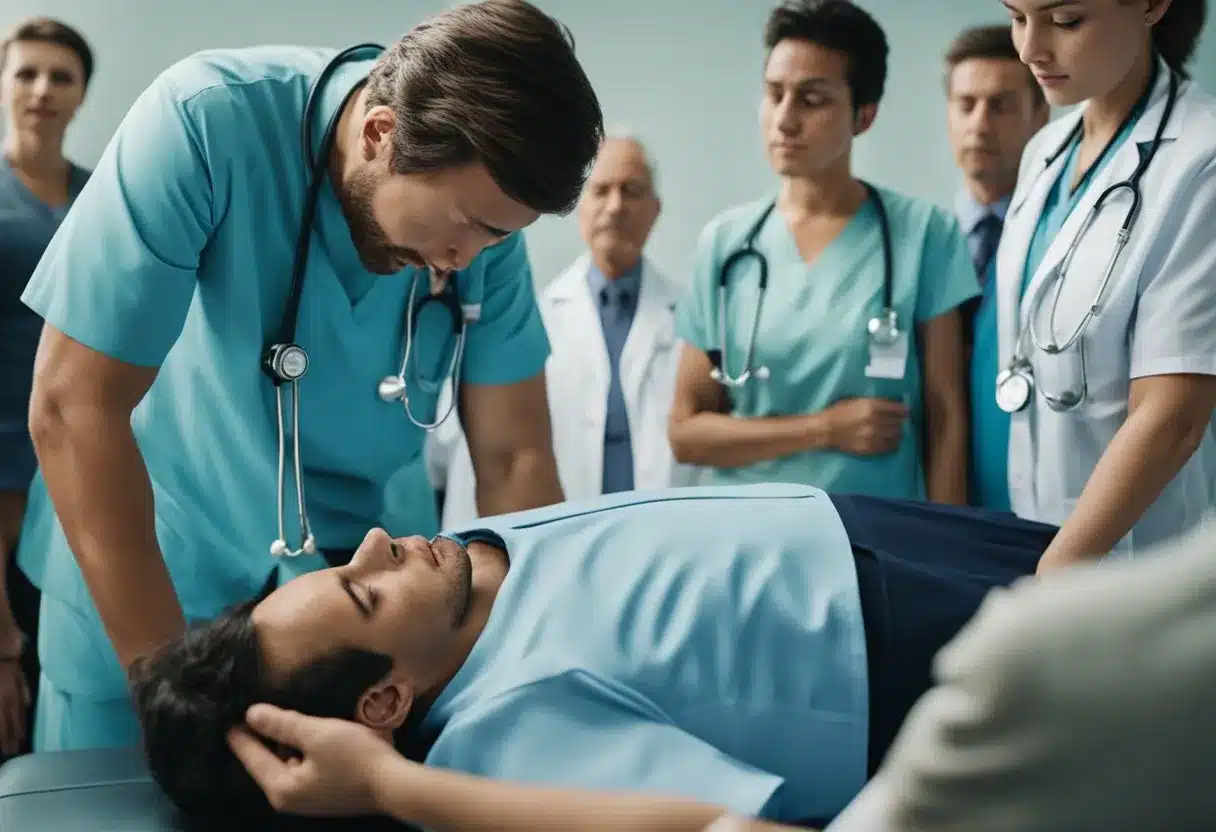
When someone faints, doctors use different tests to find the cause. Treatment depends on what’s making the person faint. It can range from simple lifestyle changes to medicine or devices.
Medical Assessments
Doctors start by asking about a person’s health history and what happened when they fainted. They often do a physical exam to check vital signs. Blood tests can show if there’s a problem with blood sugar or other issues.
An electrocardiogram (ECG or EKG) is a key test. It checks the heart’s electrical activity. Some people may need to wear a heart monitor for a while. This can catch any odd heart rhythms.
Other tests might include:
- Tilt table test
- Stress test
- Brain scans (like MRI or CT)
These help doctors see if fainting is due to heart, brain, or other problems.
Treatment Options
Treatment aims to stop fainting and prevent injuries. For many, simple steps can help:
- Drinking more water
- Eating regular meals
- Avoiding triggers (like standing up too fast)
If a health issue is causing faints, that needs to be fixed. Heart problems might need medicine or a pacemaker. Blood pressure issues can often be treated with medication.
Some people learn ways to prevent faints. This might mean lying down when feeling dizzy. Others may need to wear compression stockings to help blood flow.
In rare cases, surgery might be needed. But most of the time, fainting can be managed with less intense treatments.
Understanding Complications

Fainting can sometimes lead to complications. While most cases are harmless, certain situations may pose risks.
Head injuries can occur if a person falls when fainting. This is especially dangerous for older adults or those with brittle bones.
In rare cases, fainting may be a sign of a serious underlying condition. These can include heart problems or neurological issues.
Some people may experience seizures during or after fainting. This can be mistaken for epilepsy, but it’s often related to the fainting episode itself.
Frequent fainting episodes can disrupt daily life. They may limit a person’s ability to drive or perform certain jobs safely.
Here are some potential complications of fainting:
- Cuts or bruises from falling
- Broken bones
- Concussions
- Tongue biting
- Loss of bladder control
It’s important to see a doctor if fainting happens often or is accompanied by other symptoms. They can help determine if there’s an underlying cause that needs treatment.
In some cases, fainting can be a sign of a life-threatening condition. Seek immediate medical attention if fainting is accompanied by chest pain, shortness of breath, or irregular heartbeat.
Remember, while most fainting episodes are not serious, understanding the potential complications can help ensure proper care and prevention.
Frequently Asked Questions
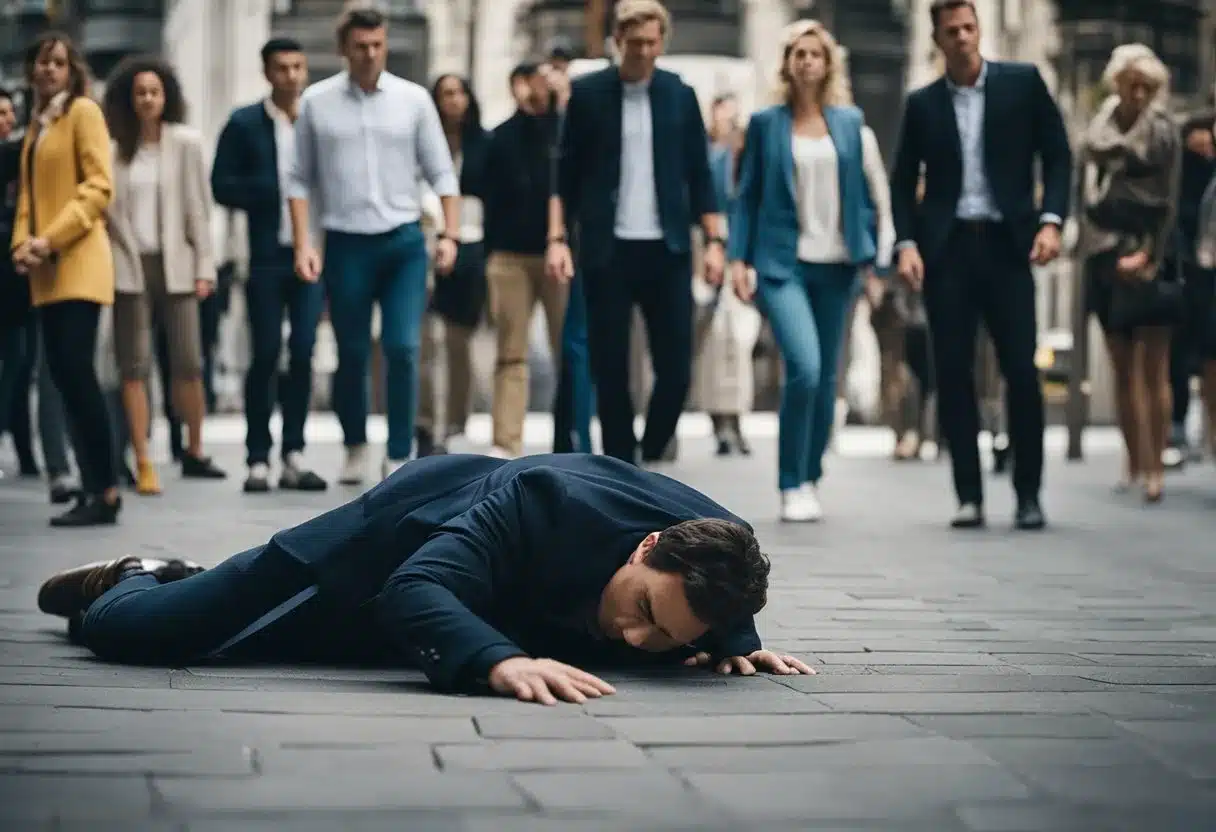
Fainting can be a concerning experience. Here are some common questions people have about fainting episodes and their effects.
What are typical symptoms indicating you might faint?
People often feel dizzy or lightheaded before fainting. They may also experience blurred vision, sweating, and nausea. Some people report ringing in their ears or feeling weak.
The skin might turn pale or clammy. A person may feel their heart racing or experience tunnel vision.
Is it possible to die from a fainting episode?
Most fainting episodes are not life-threatening. However, in rare cases, fainting can be a sign of a serious heart problem.
If fainting happens frequently or is linked to chest pain, it’s important to see a doctor. Underlying health issues can sometimes make fainting dangerous.
What are the potential consequences if someone faints when alone?
Fainting alone can be risky. A person might hit their head or injure themselves when falling. This can lead to concussions or other injuries.
They might also end up in a dangerous position, like face down. This could block their airways. If no one is around to help, recovery might take longer.
What are common side effects experienced after regaining consciousness from a faint?
After fainting, people often feel confused or disoriented. They might have a headache or feel nauseous. Some experience muscle aches from the fall.
Feeling tired or weak is common. Anxiety or embarrassment may also occur, especially if the fainting happened in public.
What can be done to reduce the likelihood of fainting?
Staying hydrated and eating regular meals can help prevent fainting. Avoiding standing for long periods or getting up slowly from sitting or lying down is also helpful.
Recognizing early warning signs can allow a person to sit or lie down safely. Managing stress and avoiding overheating are other useful strategies.
What might trigger sudden episodes of fainting and dizziness?
Sudden drops in blood pressure can cause fainting. This might happen due to dehydration, standing up too quickly, or certain medications.
Emotional stress, pain, or seeing blood can trigger fainting in some people. Heart problems, low blood sugar, or overheating are other possible causes.